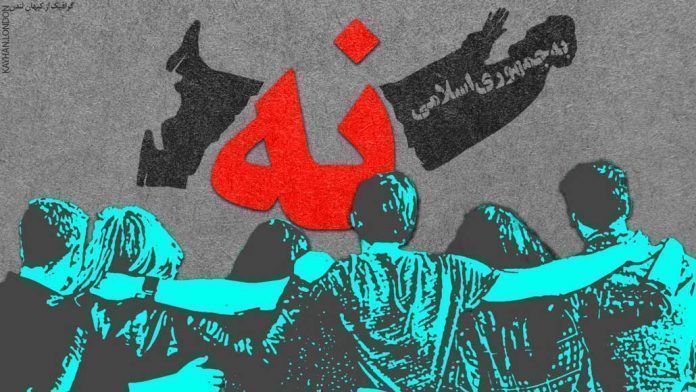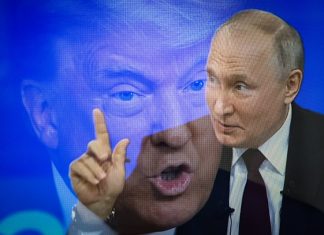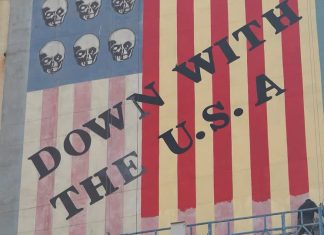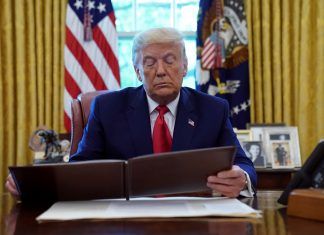By Hamed Mohammadi and Elahe Boghrat
Iran’s Crown Prince Reza Pahlavi and several political activists, pro-democracy campaigners, and rights advocates in Iran and abroad took part in an online conference titled “No to the Islamic Republic, Yes to National Unity” on June 11.
The Islamic Republic is trying to project a united front in the face of low public trust in the integrity and legitimacy of the 13th Iranian presidential elections to be held on June 18.
Fatemeh Sepehri and Narges Mansouri, two political and civil rights activists inside Iran, spoke in the first segment of the conference. Ms. Sepehri and Ms. Mansouri are also the signatories to the 2019 “Statement of 14 Political Activists”.
Other speakers included Hassan Shariatmadari, Karim Shambiati, Nahid Bahmani, Favad Pashaei, Masih Alinejad, Shahin Najafi, Masoud Noghrehkar, Mehran Shahrkhani, Amir Hossein Etemadi, Esmaeil Nouriala, and Prince Reza Pahlavi.
Journalists and reporters from several media outlets asked the panel questions in the second part of the conference. In addition, a video recording of the entire conference is available on YouTube and can be accessed through the Kayhan London website.
Prince Reza Pahlavi unveiled his “New Covenant” on Sept. 28, 2020, which rejects “individual rule and centralized power in today’s world” and promotes “collective wisdom, public involvement, and individual responsibility.”
OPINION: As Reza Pahlavi Turns 60, A Call for Freedom in Iran
Under the New Covenant, “the only acceptable alternative is the will of the Iranian people that establishes a governing system where nothing is above the laws created through free elections.”
How can we achieve popular sovereignty and free elections as long as there is no national unity and collective will?
“I extend a helping hand to all pro-democracy groups, irrespective of their history and past affiliations,” Reza Pahlavi declared. “They must put aside their difference, self-importance, and rivalry and instead focus on a single goal of rescuing Iran.”
The conference opened with a heart-wrenching video message from Mahboubeh Ramezani, the mother of Pejman Gholipour, a teenager killed by security forces during the November 2019 nationwide protests.
[aesop_image img=”https://kayhanlife.com/wp-content/uploads/2019/12/javanan_aban98.jpg-protest-.jpg” panorama=”off” credit=”photographs of many of the Iranians who lost their lives in the wave of fuel-price protests. SOURCE: KAYHAN LONDON” align=”center” lightbox=”on” captionsrc=”custom” captionposition=”left” revealfx=”off” overlay_revealfx=”off”]
SPECIAL REPORT- Iran’s Leader Ordered Crackdown on Unrest: “Do Whatever It Takes to End It”
Citing the crimes committed by the Islamic Republic in the past four decades, Ms. Ramezani called for unity and urged people to boycott the elections.
“I do not want another mother to hold a picture of her child and see a hole in his heart at a hospital,” Ramezani said. “My son’s share was five bullets!”
In a video clip, the conference heard from Fatemeh Maleki, who read a message on behalf of her husband, Mohammad Nourizad, warning that those “who participate in the elections would dip their votes in people’s blood.”
Fatemeh Sepehri opened the conference with a brief speech, voicing concerns about the health and security of political prisoners in Iran. Ms. Sepehri said that she became disillusioned with the regime back in 1981, adding that she would work against it as long as she lived..
Sepehri urged everyone to join forces “so that we can breathe after the Islamic Republic.” She asked the international community to help Iranians but reiterated her previous remark that “anyone who leaves the Islamic Republic and goes abroad does not represent the people.”
Another speaker, Narges Mansouri, a political activist, and human rights campaigner who opposes the Islamic Republic, called for an end to factional disputes. Instead, she urged everyone to unite around the Iranian people’s wishes for democratic rule.
Ms. Mansouri stressed the need for greater unity against the Islamic Republic, arguing that various movements should be devoid of personal interests and factional agendas because the alternative to the current regime in Iran will ultimately emerge from within the opposition movements.
Pedram and Ariya, two activists who live in Iran, also spoke at the conference about the conditions in the country.
Pedram noted Iran has been experiencing one crisis after another during his lifetime. So why have efforts to battle the situation been unsuccessful, he asked? He cited discord among opposition groups outside Iran and severe disconnect between people in the country and those living abroad as the primary cause of failure to change the situation.
Pedram identified factional agendas and personal interests as the primary obstacles to unity, which in his view, were detrimental to the Iranian people. Pedram highlighted the need for a plan and roadmap that ensures a “soft and non-violent transition.”
He rejected any form of violence and armed struggle, which, in his view, would only serve the regime. Pedram said that any change depended on the Iranian youths, whose life and security was paramount. He said that any plan must address the situation in the country. Pedram also highlighted the need for a unified country, warning that it was the Iranian people’s red line.
Ariya noted that most Iranians were disappointed in conservative and reformist rule alike, but hoped to get through the situation by saying they “were not political.” He argued that any meaningful change would only result from a united popular front against the Islamic Republic, defection among the members of security forces who wish to join the people, and solidarity among the opposition groups.
These three pivotal events combined with countrywide strikes and protests will bring about change, Ariya added.
[aesop_image img=”https://kayhanlife.com/wp-content/uploads/2021/06/2021-06-16T125600Z_1136962107_RC2N1O97ARZF_RTRMADP_3_IRAN-ELECTION-scaled.jpg” panorama=”off” credit=”Iranian people walk in Tehran Bazaar, in Tehran, Iran June 16, 2021. REUTERS./” align=”center” lightbox=”on” captionsrc=”custom” captionposition=”left” revealfx=”off” overlay_revealfx=”off”]
Hassan Shariatmadari, the general secretary of the Iran Transitional Council, said: “Iranian citizens have let the international community know that they are a proud and independent people and not a weak nation that submits to the will of a murderous leader and a corrupt and ineffective regime. Their decision has led our fellow Iranians into a serious phase.”
Mr. Shariatmadari said representatives from various groups at the “No to the Islamic Republic” conference were few examples of the greater diversity in Iranian society.
Highlighting the Islamic Republic’s plight as a pariah state, Karim Shambiati, a member of Alliance for a New Beginning, said: “Fear of the people has penetrated every layer of the regime. The public demands an end to corruption and rampant violence. “
A well-informed public that has exposed the regime’s anti-Iranian nature has now pushed the authorities in the Islamic Republic into a corner, Mr. Shambiati added. He also called on everyone to boycott the elections.
Masih Alinejad, a journalist and women’s rights campaigner, said the conference aimed to promote “national unity among the pro-democracy opposition groups,” adding that people in Iran rejected the Islamic Republic during the nationwide protests in December 2017 and November 2019.
“The opposition must form a long line against the Islamic Republic outside the country now,” Ms. Alinejad noted.
Inspired by peaceful protests and other countries’ experiences, Alinejad proposed holding a rally under the banner “No to the Islamic Republic” on a specific day in all the nations around the world where Iranians live. She also proposed establishing a national parliament comprising representatives from various groups and people of all walks of life.
Massoud Noghrehkar, the spokesperson for the Social Democracy for Iran, said the Islamic Republic insults Iranian people’s intelligence and human dignity by holding fake elections. He implored those who plan to go to the ballot boxes “not to vote for the murderers of the country’s children.”
Mr. Noghrehkar said boycotting the election would be a step towards strengthening the freedom movement.
Esmaeil Nouriala, the spokesperson for the Iranian Secular Democratic Party, noted that the “majority of Iranians have become disillusioned with the Islamic Republic’s ability to reform itself. As a result, they have said no to the regime.”
Mr. Nouriala said he was delighted that representatives from various groups had taken part in the conference under the banner of “Yes to National Unity,” adding that he hoped the participants in the online event would deliver on promises they make to the Iranian people.
Mehran Shahrkhani, a member of the Pan-Iranist Party, stressed the need for forming national unity around a unified Iran, which encompasses the entire country. He said a unified country that embraces its diversity is the national unity’s red line.
Shahin Najafi, a famous singer, said: “I express myself through my art, and although I am not a politician, I believe everyone is involved in politics.”
Mr. Najafi divided his thoughts into three categories. They included “truth and transparency,” “thoughts and queries,” and “freedom and action.” Najafi noted that freedom and transparency are the antitheses of secretiveness.
He stressed the need for “exposing political affiliations, disclosing people’s history, demanding transparency in economic and financial relationships, and battling lies, conspiracies, and secrecy.”
Amir Hossein Etemadi, a member of the political action network Iran Revival (Farashgard), called on all groups to put aside their differences. He said only by focusing on their common goal could these groups rescue the country and the nation.
Stressing on hope and the country’s future, Mr. Etemadi said that Iranians must be confident that the situation in Iran will vastly differ in the post-Islamic Republic era. Moreover, they must know that future Iran will be a free, just, and prosperous nation, devoid of discrimination.
Nahid Bahmani, a member of the Komala Party of Iranian Kurdistan, said that boycotting the elections will strengthen Iranians’ national unity and collective will. She noted that boycotting the “farcical elections would speed up the disintegration of the regime.”
Ms. Bahmani explained that the Islamic Republic’s aim for holding elections was to legitimize its rule on the international scene by extracting votes from the public. She said Iranians who boycott the elections must also persuade their neighbors not to vote.
Favad Pashaei, secretary-general of the Constitutional Party of Iran (Liberal Democrats), said the 2019 “Statement of 14 Political Activists” marked the start of the “No to the Islamic Republic” movement. It has gradually clarified the aims of the campaign.
Highlighting remarks by Fatemeh Sepehri and Narges Mansouri and families seeking justice for their loved ones, Mr. Pashaei said: “Those of us living abroad must be the voice of Iranians in the international community.”
Prince Reza Pahlavi hailed “political pluralism” shown by the diverse groups participating in the conference, describing it as a hopeful sign for a future Iran where “political coexistence” will be a norm.
“National unity is the strongest opponent of totalitarian and dictatorial regimes,” Reza Pahlavi said. “No domestic or foreign power can defeat national will and unity.”
“We must put our trust in the intelligence and wisdom of our fellow Iranians, who have gained immense and valuable experience and will decide their future with an open eye this time around,” Mr. Pahlavi said. “History and future generations will judge you, remembering where you stood during these sensitive and crucial times.”
“I call on all political groups and activists to join forces and focus our attention on Iran and realizing the inalienable rights of Iranians to self-govern.”
Journalists and reporters from several media outlets asked the panel questions in the second part of the conference. In addition, a video recording of the entire conference is available on YouTube and can be accessed through the Kayhan London website.
Why was this conference important?
Prince Reza Pahlavi unveiled his “New Covenant” on Sept. 28, 2020, which rejects “individual rule and centralized power in today’s world” and promotes “collective wisdom, public involvement, and individual responsibility.”
Under the New Covenant, “the only acceptable alternative is the will of the Iranian people that establishes a governing system where nothing is above the laws created through free elections.”
Reza Pahlavi Urges Iranians to Join Forces and Liberate Homeland
How can we achieve popular sovereignty and free elections as long as there is no national unity and collective will?
“I extend a helping hand to all pro-democracy groups, irrespective of their history and past affiliations,” Reza Pahlavi declared. “They must put aside their difference, self-importance, and rivalry and instead focus on a single goal of rescuing Iran.”
While the events of the past few years have given cause to the Islamic Republic to worry about its fate — including the downing of the Ukrainian commercial Flight PS752, the bloody nationwide protests in December 2017 and November 2019, persistent civil unrest, and ongoing strikes by various segments of Iranian society — they have strengthened Iranian people’s unity and resolve against the regime.
Therefore, the participants in the conference placed a great deal of emphasis on national unity and organizing their efforts around a common goal, including overcoming the Islamic Republic regime and preparing for a parliamentary system to realize national sovereignty in a unified Iran. This is a significant step in a movement that started in the early days of the Islamic Revolution and continues today.
The alternative to the current ruling regime in Iran cannot form outside the domestic political, civil, unions and rights movements and pro-democracy campaigners abroad.








